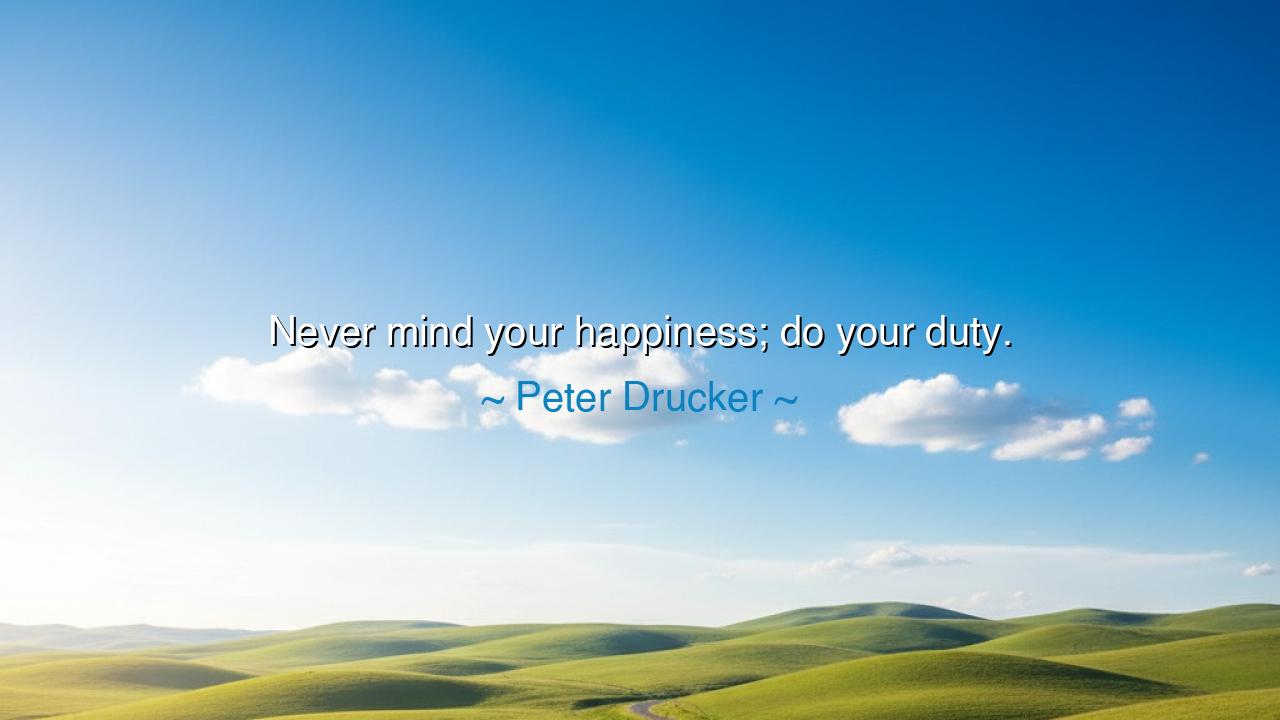
Never mind your happiness; do your duty.






"Never mind your happiness; do your duty." These are the solemn words of Peter Drucker, the wise architect of modern management, yet their echo reaches far beyond the boardroom. They belong not merely to the realm of commerce but to the ancient language of honor, discipline, and virtue. For in every age, there arises a conflict within the heart of humankind—the struggle between the fleeting desire for happiness and the steadfast call of duty. Drucker’s command is not cold; it is clarifying. It reminds us that greatness is not born from pleasure, but from purpose.
In the world of the ancients, duty was the very essence of life. The samurai of Japan called it giri—the sacred obligation that outweighs personal comfort. The Roman spoke of virtus—the moral strength to act rightly despite cost. The Stoics, too, taught that the wise man does not chase happiness, for happiness is the shadow of virtue, not its master. Happiness is the byproduct of living rightly, not the goal. It cannot be seized by those who seek it directly, but it comes quietly to those who forget themselves in service to something greater.
Think of Marcus Aurelius, Emperor of Rome. Though wrapped in the weight of empire, he did not speak of joy or ease, but of duty—to govern with justice, to accept hardship with grace, to serve the world as a limb serves the body. In his journal, Meditations, he wrote: “It is not that life is too short, but that we waste much of it.” He did not ask if ruling made him happy; he asked only whether he ruled rightly. His life was not easy—but it was noble. And from that nobility, deeper peace was born, far greater than mere contentment.
The one who lives only for happiness is like a ship chasing the reflection of the moon upon the sea—it moves, but never arrives. Yet the one who lives for duty sails with purpose, guided by the stars of principle and honor. Happiness may come or go like the tide, but the sense of having done what is right anchors the soul against despair. The soldier who defends his home, the parent who works in silence, the healer who tends the sick—all may suffer, but in their hearts burns a light unshaken by circumstance.
There is an ancient story from India, told in the Bhagavad Gita, where the warrior Arjuna falters on the battlefield, torn between his sorrow and his calling. To him, the god Krishna speaks: “Perform your duty, for action is better than inaction. To act without attachment is to be free.” This is the eternal truth of Drucker’s words. Duty does not chain us—it releases us from the tyranny of emotion. It teaches us to do what must be done, not what feels pleasant, and in doing so, we transcend the small self that hungers for comfort.
Happiness is fragile; it bends with fortune’s wind. Duty is eternal; it stands like the mountain. When we live by duty, we align ourselves with the rhythm of creation. The farmer plants in storm or sun, the teacher guides through weariness, the leader serves through solitude. They may not smile every hour, yet their hearts are full with something higher than joy—a quiet dignity, the satisfaction of being faithful to the task appointed to them by life itself.
The lesson is this: seek not happiness, but honor. Let duty be your compass, and happiness will find you as the dawn finds those who keep watch through the night. Ask not, “Does this make me happy?” but “Is this right? Is this worthy of me?” For the one who does his duty, even in darkness, walks with the light of truth within. And that light—unlike happiness—never fades.
So rise each day, as the ancients did, with resolve upon your breath and strength in your heart. Do your work. Keep your word. Serve without complaint. And when your body grows weary, know that you have lived not for the glitter of pleasure, but for the gold of purpose. Never mind your happiness; do your duty. In the end, duty will deliver you to a peace deeper than happiness—the peace of a life well-lived.






AAdministratorAdministrator
Welcome, honored guests. Please leave a comment, we will respond soon